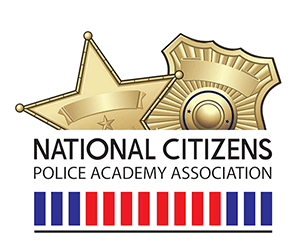NCPAA FAQ
CPA Certification
Do you want your agency to put together a tried-and-true public relations program? Your agency representatives attending the National Citizens Police Academy Association’s (NCPAA) Citizens Police Academy Coordinator’s Certification and Re-Certification training will be given the tools of knowledge to develop your program and build upon it to improve your police community relationships and communication.
The NCPAA is a leader in Community Partnerships and Law Enforcement Citizen Police Academy training. The NCPAA networks with law enforcement agencies around the United States, its territories and Canada, meeting with and talking with Citizen Police Academy (CPA) coordinators and Citizen Police Academy Alumni Associations (CPAAA) to gather information, fresh ideas, and safety techniques to improve upon the Citizens Police Academy concept and share best practices.
The information, fresh ideas, and safety techniques garnered are then passed on to its membership through the NCPAA Certification and Re-Certification classes held during the NCPAA’s annual conference.
The Citizens Police Academy Coordinator Certification Course is specifically designed for law enforcement officers or agency representatives tasked with developing and managing their Citizens Police Academy. The course was developed by Lois Welling (Police Training Institute in Champaign, Illinois). Only attendees who successfully pass the examination will receive a Citizens Police Academy Coordinators Certification Certificate recognizing their training in the application of the Citizens police Academy concept.
Renewal of this Certification is recommended every three years to keep current with ongoing improvements and changes.
Applicants wishing to attend the Citizens Police Academy Coordinator Certification Course or refresher, must submit with their registration, written endorsement from their agency approving their attendance.
What is the Citizen Police Academy?
These programs are intended to open the lines of communication between the Community and the Police Department. Generally, the relationship between the police and the citizen is one of “love/hate”. To the Citizen, it may frequently appear that the police are not doing their job or are exceeding their boundaries. By allowing citizens a firsthand look at what rules, regulations and policies the police follow, some of the misunderstanding may be alleviated. The objective of the Citizen Police Academy is not to train an individual to be a “Reserve Police Officer” but to produce informed citizens.
The Citizens and Police Officers meet each other face to face in a neutral, friendly setting and each becomes a person to the other. In the past, citizens have simply seen a uniform, now they have an understanding about the person behind the badge.
What is the history of the Citizen Police Academy?
The founders received an immediate response from the public. They were soon overwhelmed with applicants wanting to know about “their” police force. The project was so successful that it was permanently adopted as part of an ongoing police public relations program. In 1985, the Orlando, Florida Police Department adopted the concept of the Police Night School for their agency and created the first Citizen Police Academy in the United States.
The ultimate goal of the Orlando Citizen Police Academy was to reduce crime through a stronger citizen commitment to the Police Department and the Community. Success was instantaneous and a new law enforcement tool was found. Word of the success spread and in that same year Missouri City, Texas joined in and adopted the same concept. Today you will find Citizen Police Academy programs throughout the United States in communities large and small.
How do I become a member of the National Citizen Police Academy Association?
I would like to be nominated to the Board of Directors of the NCPAA. How do I go about doing this?
Each year at the Annual National Citizen Police Academy Conference, the vacating spots on the Board are voted on by the General Membership. The term of a Board DIRECTOR is three years. To be nominated, you must be a member in good standing and be willing to Chair a committee. You need to also contact a member of the Nominating Committee.
Can small departments also have a successful Citizen Police Academy program?
How do I locate a Department which offers a Citizen Police Academy Program?
If you’re having trouble locating a CPA near you, please contact us and we will advise of the closest program to your area.
I would like to make a donation to the National Citizen Police Academy Association. Would my contribution be tax deductible?
Donations to the NCPAA may be made on our DONATIONS PAGE
What awards are given by the National Citizen Police Academy Association?
Awards will be presented at the Conference for the following categories:
Agency of the Year
CPA Liaison of the Year
Alumni Association of the Year
Alumni Member of the Year
Please fill out the awards online application form
